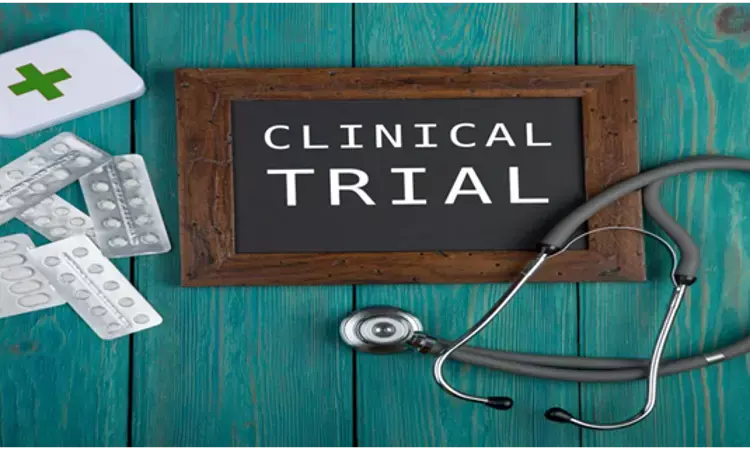- Home
- Medical news & Guidelines
- Anesthesiology
- Cardiology and CTVS
- Critical Care
- Dentistry
- Dermatology
- Diabetes and Endocrinology
- ENT
- Gastroenterology
- Medicine
- Nephrology
- Neurology
- Obstretics-Gynaecology
- Oncology
- Ophthalmology
- Orthopaedics
- Pediatrics-Neonatology
- Psychiatry
- Pulmonology
- Radiology
- Surgery
- Urology
- Laboratory Medicine
- Diet
- Nursing
- Paramedical
- Physiotherapy
- Health news
- Fact Check
- Bone Health Fact Check
- Brain Health Fact Check
- Cancer Related Fact Check
- Child Care Fact Check
- Dental and oral health fact check
- Diabetes and metabolic health fact check
- Diet and Nutrition Fact Check
- Eye and ENT Care Fact Check
- Fitness fact check
- Gut health fact check
- Heart health fact check
- Kidney health fact check
- Medical education fact check
- Men's health fact check
- Respiratory fact check
- Skin and hair care fact check
- Vaccine and Immunization fact check
- Women's health fact check
- AYUSH
- State News
- Andaman and Nicobar Islands
- Andhra Pradesh
- Arunachal Pradesh
- Assam
- Bihar
- Chandigarh
- Chattisgarh
- Dadra and Nagar Haveli
- Daman and Diu
- Delhi
- Goa
- Gujarat
- Haryana
- Himachal Pradesh
- Jammu & Kashmir
- Jharkhand
- Karnataka
- Kerala
- Ladakh
- Lakshadweep
- Madhya Pradesh
- Maharashtra
- Manipur
- Meghalaya
- Mizoram
- Nagaland
- Odisha
- Puducherry
- Punjab
- Rajasthan
- Sikkim
- Tamil Nadu
- Telangana
- Tripura
- Uttar Pradesh
- Uttrakhand
- West Bengal
- Medical Education
- Industry
High-dose methylcobalamin slows functional decline in early-stage amyotrophic lateral sclerosis: JAMA

JAPAN: Ultra-high-dose of methylcobalamin in patients with early-stage amyotrophic lateral sclerosis (ALS) and with a moderate progression rate is effective in slowing functional decline, states a recent study in JAMA Neurology. Also, it was found that it is safe to use during the 16-week treatment period.
ALS is a neurodegenerative disease typically presented with muscle weakness and atrophy. Without a mechanical ventilator, patients succumb to the disease within 3–6 years from its onset. A widely used drug, Riluzole, provides modest prolongation of survival (2–3 months), but no positive effect on muscle strength or bulbar function. Thus further treatments need to be developed. Ultra high-dose methylcobalamin, an active vitamin B12, appeared as a promising agent for ALS treatment in Initial studies. Moreover, a small-sized study has demonstrated that ultra-high-dose methylcobalamin prolongs ventilation-free survival in the early stage.
Author Ryosuke Oki and colleagues conducted a long-term phase II/III clinical trial to evaluate the efficacy and safety of intramuscular ultra-high-dose methylcobalamin in Japanese patients with ALS within 1 year of onset.
The study was a multicenter, placebo-controlled, double-blind, randomized phase 3 clinical trial with a 12-week observation and 16-week randomized period, conducted from October 17, 2017, to September 30, 2019. A total of 130 patients (mean age, 61.0 years; 74 men [56.9%]) were recruited from 25 neurology centers in Japan. Patients were randomly assigned through an electronic web-response system to methylcobalamin or placebo. A total of 129 patients were eligible for the full analysis set, and 126 completed the double-blind stage. Of these, 124 patients proceeded to the open-label extended period. Change in ALSFRS-R total score from baseline to week 16 in the full analysis set was used as the primary endpoint.
The key findings of the study are,
• The least-square means difference in ALSFRS-R (Revised Amyotrophic Lateral Sclerosis Functional Rating Scale ) total score at week 16 of the randomized period was 1.97 points greater with methylcobalamin than placebo (−2.66 vs −4.63).
• The incidence of adverse events was similar between the 2 groups.
Results showed that ultrahigh-dose methylcobalamin was efficacious in slowing functional decline in early-stage ALS with a moderate progression rate and was safe to use during the 16-week treatment period. However, Ultra-high-dose methylcobalamin was not found to be significantly superior to placebo.
The author commented that therapeutic agents that failed in the previous clinical trials could be reanalyzed for potential efficacy in ALS, taking into account the duration of the disease at the start of therapy.
Criteria enabling earlier diagnosis and a change in the physician's attitude towards an early diagnosis and treatment should yield better future outcomes for the patients than ever.
Reference:
Oki R, Izumi Y, Fujita K, et al. Efficacy and Safety of Ultrahigh-Dose Methylcobalamin in Early-Stage Amyotrophic Lateral Sclerosis: A Randomized Clinical Trial. JAMA Neurol. Published online May 09, 2022. doi:10.1001/jamaneurol.2022.0901
BDS
Dr. Hiral patel (BDS) has completed BDS from Gujarat University, Baroda. She has worked in private dental steup for 8years and is currently a consulting general dentist in mumbai. She has recently completed her advanced PG diploma in clinical research and pharmacovigilance. She is passionate about writing and loves to read, analyses and write informative medical content for readers. She can be contacted at editorial@medicaldialogues.in.
Dr Kamal Kant Kohli-MBBS, DTCD- a chest specialist with more than 30 years of practice and a flair for writing clinical articles, Dr Kamal Kant Kohli joined Medical Dialogues as a Chief Editor of Medical News. Besides writing articles, as an editor, he proofreads and verifies all the medical content published on Medical Dialogues including those coming from journals, studies,medical conferences,guidelines etc. Email: drkohli@medicaldialogues.in. Contact no. 011-43720751


